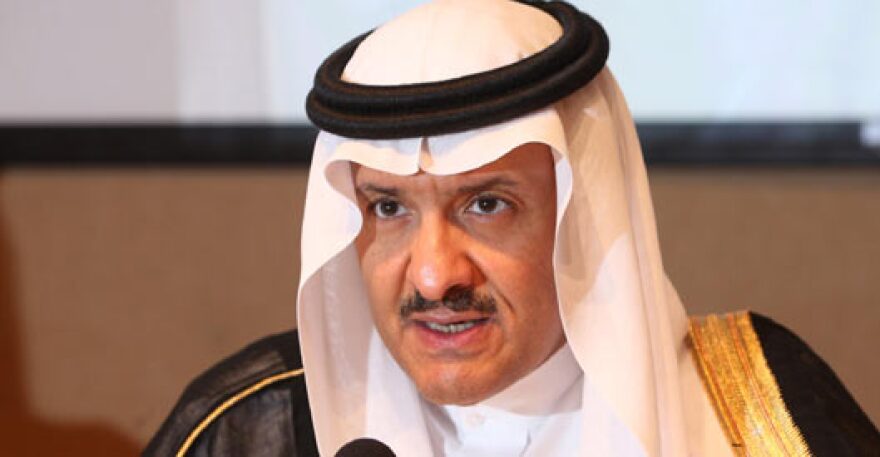There are more than 200 works in the traveling exhibition, Roads of Arabia: Archaeology and History of the Kingdom of Saudi Arabia, from the fourth millennium B.C. to the 1930s.
The exhibit, now at the Nelson-Atkins Museum of Art in Kansas City, Mo., features prehistoric tools and figures sculpted by early inhabitants, as well as ceramic vessels, jewelry, coins, tombstones and sculptures — ranging in size from small to monumental.
It's only in the last four decades that archaeological digs have uncovered these objects during excavations of former commercial hubs or religious sites in Saudi Arabia along two routes: the incense roads, a network of trade with the exchange of frankincense and myrrh; and the pilgrimage trails to Mecca, the holy Islamic site.
Before 2010, this material had not traveled outside of the Arabian peninsula. But since that time, Roads of Arabia has toured Europe and now, the Nelson-Atkins marks one of five venues on the North American tour.
His Royal Highness Prince Sultan bin Salman bin Abdulaziz, president of the Saudi tourism commission, traveled to Kansas City for the opening ceremonies for the exhibition.
Interview Highlights:
Some of the objects in Roads of Arabia were uncovered by accident – and others were part of archaeological research that started in the 1970's. Could you talk about the impetus behind these excavations?
"I'm not an archaeologist, but I manage the archaeology section of our Kingdom. I think archaeology is a window, not just to the past, a window to life, a window where we can see ourselves; it's almost a mirror.
For the efforts that we've been doing since the early '70s and of course, until today, which has massively been expanded, we're finding out more and more about not just who we are, but I'd really say, how we got here...We reflect also where we're going in the future, in the sense, as a country and as a people.
What we're finding in Saudi Arabia today are several things, among them that we have always been wealthy. So oil has not been just a singular event and the source of wealth...it came to a people who have had an incredibly great history, extending through thousands of years.
In the past, it was probably the spices, and incense, and the different items that came through this strategic geographic location which we call Arabia. And the people of Arabia protected the trade caravans, if you like, and traded with them. The very same people are today, protecting this great country and its economy, trading with the rest of the world."
I spoke to one of the (Saudi Arabian) students who's studying at UMKC. And he said that there are sometimes misperceptions about people who live in Arabia. He said, "I've never ridden a camel, I don't live in a tent." As part of your outreach efforts, are you trying to dispel some of these ideas?
"I think they're good misperceptions. Camels are beautiful. It's like saying Americans never had cows and never ride horses. We love camels. I ride camels and I live in tents. My most pleasure in life, in the winters of Saudi Arabia, is to be in a tent.
But at the same time, I just flew an American-made airplane as a captain. (Eds. note: He piloted his own plane to Kansas City). I use an American-made computer. My organization is the most, one of the most advanced in Saudi Arabia, in terms of IT and technology and we see these things complimenting each other.
I like that in a country and in a people, that don't think of themselves as lesser because of who they are.
The misperception that I would like to dispel though is that Saudi Arabia is all about oil. It's not really all about oil. Oil is something we use, and we'd like more of it, if there's more of it, to pump into what we need.
You’re a former Royal Saudi Air Force pilot, and you were also part of the crew of the space shuttle Discovery in 1985 – the first Muslim, Arab, and the only royal, in outer space. What was that experience like?
"When I was in the Discovery mission, I was actually three personalities in the same time: I was a human being, and I was a pilot, also I was a kid, if you want to call it that. I just had a childish kind of eagerness...in the sense of being curious, being excited about the experience, almost blocking out all probably expected fear...really wasn't, not because I was brave, but because I was basically blinded by the expectations of the experience.
And in the space shuttle, as a pilot, I was very much interested in the performance of the shuttle, the launch, the technicalities, but as a human being, I was also interested in what you can see from space: the distance, 90 minutes, you're going around the world every 90 minutes, you see 16 sunsets and sunrises every single day, life with the crew...
When somebody asked me, 'How did you see Earth from space?' and I said, it completely surprised me the answer, because it wasn't prepared, I said, 'You know, when you look at the Earth from space, first day or two, we were pointing to our countries; maybe third or fourth day, we were pointing to our continents; by the fifth day, we were only aware of one Earth.' So that's a human experience, rather than a pilot experience.
I was very fortunate, you know, very fortunate for that opportunity. And I've spent a lifetime trying to pay back, the good fortune of being involved in such an opportunity."
Roads of Arabia: Archaeology and History of the Kingdom of Saudi Arabia, April 25 - July 6, 2014, Nelson-Atkins Museum of Art, 4525 Oak Street, Kansas City, Mo. 816-751-1278.





